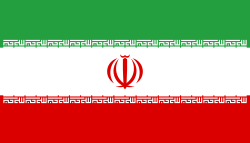Top 5 Countries With Strong Religious Influence In The World

Determining the most religious countries can be complex as it depends on how one defines and measures religiosity. However, here are five countries that are generally considered to be among the most religious in the world based on various factors such as the percentage of the population that identifies with a religion, the frequency of religious practices, and the influence of religion on society:
Countries with Strong Religious Influence In The World
- Saudi Arabia
- Iran
- India
- Indonesia
- Egypt
1. Saudi Arabia

Saudi Arabia is a country located in the Middle East, and it is known for being one of the most religiously conservative countries in the world. The Kingdom of Saudi Arabia is home to the two holiest sites in Islam, Mecca and Medina, and the country's official religion is Islam. With a population of approximately 34 million people, the vast majority of Saudi Arabia's citizens are Muslims who adhere to Sunni Islam.
Islam has played a dominant role in Saudi Arabian society for centuries. The religious practices of the Saudi people are deeply ingrained in their culture, and many aspects of daily life are guided by Islamic teachings and traditions. Saudi Arabia is governed by Islamic law, known as Sharia, which is derived from the teachings of the Quran and the Hadith.
One of the most significant religious practices in Saudi Arabia is the annual Hajj pilgrimage to Mecca. Every year, millions of Muslims from all over the world come to Mecca to perform the Hajj, which is considered one of the five pillars of Islam. The Hajj is a major event in Saudi Arabian society, and the Saudi government invests heavily in ensuring that the pilgrimage is safe and comfortable for all pilgrims.
The religious influence in Saudi Arabia is not limited to the personal lives of its citizens; it also extends to the country's politics and legal system. The Saudi Arabian government is an Islamic monarchy, and the king is considered the guardian of Islam's holy sites. The country's legal system is based on Sharia law, and the religious police, known as the Mutaween, are responsible for enforcing Islamic laws and customs.
READ ALSO » Top 10 Most Religious Countries In The World
While the religious influence in Saudi Arabia is deeply entrenched, there have been some changes in recent years. The government has made efforts to modernize and diversify the country's economy, which has led to some relaxation of the strict social and religious codes that were once enforced. For example, women in Saudi Arabia can now drive and attend public events without a male chaperone, and there has been a push to encourage greater participation of women in the workforce
2. Iran
Islam is also the dominant religion in Iran, with around 98% of the population being Muslim. Religious traditions and customs play an important role in Iranian society, and the country is home to numerous religious sites and institutions.
Iran's Religious Landscape: The Dominance of Islam
Iran, located in the Middle East, is a country with a rich history and culture. With a population of approximately 84 million people, Iran is known for being a predominantly Muslim country, with Islam playing a dominant role in shaping its society and culture.
The vast majority of Iranians are Muslims, with approximately 98% of the population adhering to Shia Islam, one of the two main branches of Islam. The remaining 2% of the population is made up of religious minorities such as Christians, Jews, and Zoroastrians.
Religion has played a significant role in Iranian society for centuries. The Islamic Republic of Iran, established in 1979 after the Islamic Revolution, is an Islamic theocracy in which the Supreme Leader, Ayatollah Ali Khamenei, is the highest authority in the country. The government is based on Islamic principles and laws, and the Iranian legal system is derived from Islamic law, known as Sharia.
Islamic practices and customs are deeply ingrained in Iranian culture, and many aspects of daily life are guided by Islamic teachings. Religious holidays such as Eid al-Fitr and Eid al-Adha are widely celebrated, and mosques and other religious sites are an important part of Iranian society.
3. India

READ ALSO » Top 10 Countries With The Lowest Population In The World
India is a country located in South Asia, known for its rich cultural and religious diversity. With a population of over 1.3 billion people, India is home to a multitude of religions, including Hinduism, Islam, Christianity, Sikhism, Buddhism, and Jainism, among others.
Hinduism is the largest religion in India, with approximately 80% of the population identifying as Hindus. Islam is the second-largest religion, making up around 14% of the population, followed by Christianity, Sikhism, Buddhism, and Jainism.
Despite the diversity of religions in India, religious tensions and conflicts have existed throughout the country's history. One of the most significant events in India's history was the partition of India and Pakistan in 1947, which led to widespread violence between Hindus and Muslims.
In recent years, there have been instances of communal violence and discrimination based on religion, particularly against Muslims and other religious minorities. The rise of Hindu nationalism, represented by the ruling party, the Bharatiya Janata Party (BJP), has also led to concerns about the marginalization of religious minorities in India.
However, India is also known for its tradition of religious coexistence and tolerance. The concept of secularism is enshrined in the Indian Constitution, which guarantees the freedom of religion and the right to practice and propagate one's religion. Many Indians also celebrate religious festivals of other faiths, and religious sites of various religions are often visited by people of all faiths.
The Indian government has also taken steps to promote religious harmony and address religious conflicts. The National Integration Council was established in 1961 to promote unity and communal harmony, and various laws have been enacted to protect the rights of religious minorities.
Although India is a secular country, religion plays a significant role in the lives of many people. Hinduism is the largest religion, followed by Islam, Christianity, Sikhism, Buddhism, and Jainism. Many religious festivals and traditions are observed throughout the year, and religious institutions have a significant presence in Indian society.
4. Indonesia

Indonesia, located in Southeast Asia, is the world's largest Muslim-majority country, with a population of over 270 million people. However, Indonesia's religious landscape is diverse, with six official religions recognized by the government: Islam, Protestantism, Catholicism, Hinduism, Buddhism, and Confucianism.
READ ALSO » Top 10 Most Visited Countries In The World 2024
Islam is the dominant religion in Indonesia, with approximately 87% of the population identifying as Muslims. Christianity is the second-largest religion, making up around 10% of the population, followed by Hinduism, Buddhism, and Confucianism.
Despite the dominance of Islam in Indonesia, religious harmony and tolerance are deeply ingrained in Indonesian society. The concept of Pancasila, the national ideology of Indonesia, emphasizes the unity and diversity of the country, including religious diversity.
Indonesia is known for its tradition of religious pluralism and syncretism, with many Indonesians practicing a blend of Islam, Hinduism, and other local beliefs. This unique form of Islam, known as Islam Nusantara, emphasizes moderation and tolerance and has contributed to the country's reputation for religious harmony.
However, there have been instances of religious tensions and conflicts in Indonesia, particularly between Muslims and Christians in some parts of the country. The government has taken steps to address these issues, including the establishment of a Ministry of Religious Affairs and the promotion of interfaith dialogue and understanding.
The Indonesian government also supports religious education and institutions, including Islamic boarding schools known as pesantren and Christian universities. Many Indonesians also celebrate religious festivals of other faiths, and religious sites of various religions are often visited by people of all faiths.
With the world's largest Muslim population, Indonesia is a predominantly Muslim country where religion is deeply ingrained in the culture. Other major religions in Indonesia include Christianity, Hinduism, and Buddhism.
5. Egypt

Egypt, located in North Africa and the Middle East, has a rich religious heritage that spans thousands of years. The country is known for its ancient temples, pyramids, and tombs, which were built by the pharaohs of ancient Egypt and are still revered today as sacred sites.
One of the most significant religious traditions in ancient Egypt was the worship of the gods and goddesses, who were believed to control the forces of nature and the afterlife. The pharaohs were seen as the intermediaries between the gods and the people, and their rule was believed to be divinely ordained.
After the spread of Christianity in the Roman Empire, Egypt became a center of Christian monasticism, with many monasteries established in the desert areas. Coptic Christianity, which originated in Egypt, remains a significant religious community in the country today.
Islam was introduced to Egypt in the 7th century during the Arab conquest, and it soon became the dominant religion in the country. Today, approximately 90% of Egyptians identify as Muslims, with Sunni Islam being the predominant branch.
Religion continues to play an important role in Egyptian society and culture. Mosques and churches are an integral part of the country's landscape, and religious holidays such as Ramadan and Eid al-Fitr are widely celebrated.
However, there have also been instances of religious tensions and conflicts in Egypt, particularly between Muslims and Coptic Christians. The government has taken steps to address these issues, including the establishment of a Ministry of Religious Endowments and the promotion of interfaith dialogue and understanding.
Islam is the official religion of Egypt, and the country has a long history of religious traditions and practices. Coptic Christianity is also a significant minority religion in Egypt, and the country is home to numerous religious sites and institutions for both Islam and Christianity.
